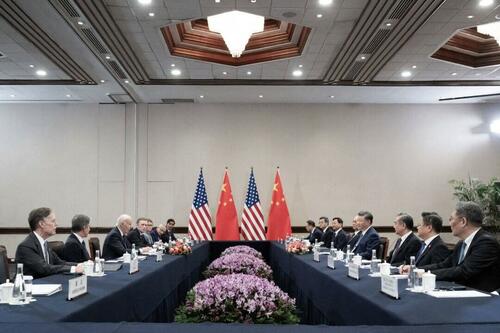
By Ryan Morgan and Emel Akan of The Epoch Times
President Joe Biden met with Chinese leader Xi Jinping on Saturday for their final in-person meeting of Biden’s presidency. During their discussion, which lasted one hour and 40 minutes, Xi expressed China’s readiness to work with the incoming U.S. administration.
The meeting took place on the sidelines of the Asia-Pacific Economic Cooperation (APEC) summit in Lima, Peru, at the hotel where Xi was staying.
During his opening remarks, Xi told Biden, “The United States has recently concluded its elections. China’s goal of a stable, healthy, and sustainable China–U.S. relationship remains unchanged.”
“China is ready to work with the new U.S. administration to maintain communication, expand cooperation, and manage differences, so as to strive for a steady transition of the China–U.S. relationship for the benefit of the two peoples.”
White House national security adviser Jake Sullivan told reporters after the meeting that Biden and Xi covered a wide range of issues, describing their discussion as “candid” and “constructive.”
Biden told Xi that “he has worked hard to responsibly manage the competition” with China for the past four years to prevent it from spiraling into conflict, Sullivan said.
Both leaders are committed to responsibly managing this relationship during the critical transition period, he added.
WATCH: Biden takes a back seat to other world leaders during an international trip, relegated to a corner spot in the traditional family photo of the world's most powerful figures, while China's president takes the prominent front-and-center position. pic.twitter.com/dyOkaPwqNW
— Fox News (@FoxNews) November 17, 2024
The two leaders also spoke about “areas of friction,” Sullivan said, citing China’s support for Russia’s defense industrial base, military activity around Taiwan, unfair trade policies, and increasing aggression in the South China Sea.
Biden and Xi also touched on China’s relationship with North Korea, particularly as U.S. and Western intelligence assessments indicate North Korea has deployed troops to assist Russian forces in their ongoing war with Ukraine.
During the meeting, Biden expressed “grave concern” about North Korea’s involvement, Sullivan said.
The White House earlier indicated that the United States and its allies—South Korea and Japan—believed “China has a role to play” in dissuading the growing Russia-North Korea partnership.
Trump’s Return
President-elect Donald Trump’s impending return to the White House also loomed large over the Biden–Xi meeting.
Trump has repeatedly signaled he will employ tariffs of up to 60 percent on made-in-China products arriving in the United States.
Trump is also set to staff his incoming administration with several China hawks. He has already named Sen. Marco Rubio (R-Fla.) and Rep. Michael Waltz (R-Fla.)—two staunch China critics—as his picks for secretary of state and national security adviser, respectively.
Beijing sanctioned Rubio twice in 2020 and banned him from entering China.
Sullivan declined to comment about Beijing’s reaction to Trump’s tariff plan.
“Look, I’m not going to comment on a future administration’s policies that have neither been formulated nor articulated,” he told reporters. “What I will say is that we have laid out in clear terms our concerns about non-market economic practices that the PRC has undertaken.”
Sullivan defended U.S. tariffs on Chinese goods, stating that many countries have taken measures to address China’s overcapacity problem in critical sectors.
Continue reading at Epoch Times
By Ryan Morgan and Emel Akan of The Epoch Times
President Joe Biden met with Chinese leader Xi Jinping on Saturday for their final in-person meeting of Biden’s presidency. During their discussion, which lasted one hour and 40 minutes, Xi expressed China’s readiness to work with the incoming U.S. administration.
The meeting took place on the sidelines of the Asia-Pacific Economic Cooperation (APEC) summit in Lima, Peru, at the hotel where Xi was staying.
During his opening remarks, Xi told Biden, “The United States has recently concluded its elections. China’s goal of a stable, healthy, and sustainable China–U.S. relationship remains unchanged.”
“China is ready to work with the new U.S. administration to maintain communication, expand cooperation, and manage differences, so as to strive for a steady transition of the China–U.S. relationship for the benefit of the two peoples.”
White House national security adviser Jake Sullivan told reporters after the meeting that Biden and Xi covered a wide range of issues, describing their discussion as “candid” and “constructive.”
Biden told Xi that “he has worked hard to responsibly manage the competition” with China for the past four years to prevent it from spiraling into conflict, Sullivan said.
Both leaders are committed to responsibly managing this relationship during the critical transition period, he added.
WATCH: Biden takes a back seat to other world leaders during an international trip, relegated to a corner spot in the traditional family photo of the world’s most powerful figures, while China’s president takes the prominent front-and-center position. pic.twitter.com/dyOkaPwqNW
— Fox News (@FoxNews) November 17, 2024
The two leaders also spoke about “areas of friction,” Sullivan said, citing China’s support for Russia’s defense industrial base, military activity around Taiwan, unfair trade policies, and increasing aggression in the South China Sea.
Biden and Xi also touched on China’s relationship with North Korea, particularly as U.S. and Western intelligence assessments indicate North Korea has deployed troops to assist Russian forces in their ongoing war with Ukraine.
During the meeting, Biden expressed “grave concern” about North Korea’s involvement, Sullivan said.
The White House earlier indicated that the United States and its allies—South Korea and Japan—believed “China has a role to play” in dissuading the growing Russia-North Korea partnership.
Trump’s Return
President-elect Donald Trump’s impending return to the White House also loomed large over the Biden–Xi meeting.
Trump has repeatedly signaled he will employ tariffs of up to 60 percent on made-in-China products arriving in the United States.
Trump is also set to staff his incoming administration with several China hawks. He has already named Sen. Marco Rubio (R-Fla.) and Rep. Michael Waltz (R-Fla.)—two staunch China critics—as his picks for secretary of state and national security adviser, respectively.
Beijing sanctioned Rubio twice in 2020 and banned him from entering China.
Sullivan declined to comment about Beijing’s reaction to Trump’s tariff plan.
“Look, I’m not going to comment on a future administration’s policies that have neither been formulated nor articulated,” he told reporters. “What I will say is that we have laid out in clear terms our concerns about non-market economic practices that the PRC has undertaken.”
Sullivan defended U.S. tariffs on Chinese goods, stating that many countries have taken measures to address China’s overcapacity problem in critical sectors.
Continue reading at Epoch Times
Loading…





